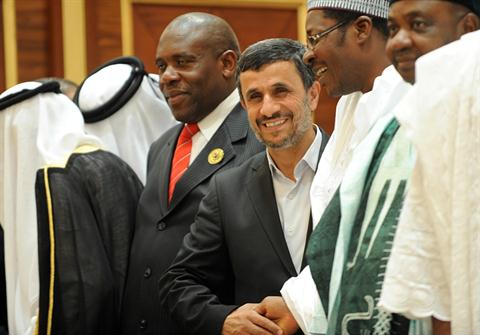The Coen Brothers’ latest cinematic opus opens with an establishing shot of the Texas wastelands, roofed with shadows and an orange sky. There isn’t one human soul; and Tommy Lee Jones’ weary, affirming voice provides the sole human element.
Jones’ character tells the story of a young kid he sent to the electric chair for murdering a 15-year-old girl. “He told me there wasn’t any passion to it,
Jones recalls, as the sun rises above the horizon and the previously static camera pans to show a police car pulled up at the side of the highway. “[He] told me that he’d been planning to kill somebody for about as long as he could remember. Said that if they turned him out he’d do it again.
As the viewers get their first glimpse of the infamous Anton Chigurh (Javier Bardem), Jones utters one more phrase that carries the core theme of the film. “The crime you see now, it’s hard to even take its measure. It’s not that I’m afraid of it. I always knew you had to be willing to die to even do this job. But, I don’t want to push my chips forward and go out and meet something I don’t understand. A man would have to put his soul at hazard.
He’d have to say, ‘OK, I’ll be part of this world.’
Shortly afterwards, the camera patiently observes Chigurh as he mercilessly strangles a police officer with his handcuffs hands. He doesn’t flinch, maintains a diabolic gaze on his face that climaxes with an ecstatic look of indifferent satisfaction. Chigurh breaks the chains and casually walks out of the door.
If you, dear reader, find those first few minutes of the film too disturbing to bear, I highly recommend you leave the theater immediately. Because what unfolds next are some of the most intense, nerve-wracking and petrifying couple of hours I’ve experienced in a long time at the movies.
The year is 1980. The Vietnam War had ended, the Regan era was about to commence, hippiedom was diminishing and America was entering the age of moral obscurity.
A Vietnam veteran named Llewelyn Moss (Josh Brolin) accidentally stumbles upon a stash of heroin and $2 million in cash following an exchange between gangs gone wrong, leaving every member of both mobs dead.
Naive Moss decides to take the cash and run away with it. Another unknown third party sends Chigurh on his trail. Chigurh is a psychopathic hit-man with a horrendous haircut and a knack for using an air-pressure boltgun, used mainly on livestock, to murder his victims.
Mayhem ensues as Moss attempts to keep one step ahead from Chigurh who murders every creature in his way for no reason. In the midst of this chaos, Sheriff Ed Tom Bell contemplates all this violence and tries to understand the unfound validation behind it.
Ever since their impressive debut “Blood Simple in 1984, films of the Coen Brothers have been regarded as an acquired taste, showered with praise from critics and major festivals around the world while garnering one of the largest fan bases in the world. Still, they never truly managed to break into the mainstream.
At $45 million, their biggest commercial success before “No Country was “O Brother, Where Art Thou? starring George Clooney. Their most popular films “Fargo and “The Big Lebowski were modest commercial hits that, nevertheless, became staples in American pop culture.
The Coens have always maintained a balance between their serious morose crime noirs and their offbeat quirky comedies (the pair’s next film is, as a matter of fact, another comedy entitled “Burn After Reading starring Clooney and Brad Pitt). Yet even their darkest works didn’t leave out their signature cartoon-like characters or avoid the heightened reality injected into small, yet noticeable, doses in those films.
This is nowhere to be found in “No Country, a masterpiece in editing, sound design, sweeping cinematography and first-rate direction that currently stands as the pair’s biggest critical and commercial success. There’s not one wasted scene in the film. Every single frame is meticulously constructed and the attention to the slightest details – from shots of footsteps, spilled milk, trails of blood, the gradual un-scrunching of a candy wrapper and the eerie close-ups of ducts and doorknobs – build up to one particular, indirect faceoff between Moss and Chigurh that left a friend of mine helplessly taking shelter behind her purse.
Perhaps the most astonishing aspect of the pair’s best film to date is how they stripped down Cormac McCarthy’s story to its bare essentials: An assassin chasing after his victim and the sheriff that represents the solitary voice of morality. What’s even more astounding is how they opted to ditch the grand Hollywood-type climax for a low-key one whereby most of the events that lead to the resolution take place off screen. This leaves the viewers to ponder and speculate the fate of some of the leading characters and pick up the pieces of the puzzle that fit their own theories.
Yet “No Country is no mere exercise of style over substance and the Coens’ perfectionism never distracts from the central premise of McCarthy’s story. The film, at heart, is an extremely nihilistic view of America in particular and the world in general, regarding humans with utter disdain and presents no possible hope or faith in human goodness.
Chigurh – one of the most terrifying, callous and sadistic villains in screen history – isn’t a real character. He has no motive, no back story and no justifications for his
actions. Like Sergio Leone’s “The Man with No Name, he’s a symbol, an inescapable force that each character must face and respond to.
He’s pure, unadulterated evil , often resorting to a coin toss to determine the fate of his victims. Chigurh regards himself as an instrument of destiny. But, as it turns out, he’s not. He’s a mere tool, and destiny, higher forces, the gods – whichever name you choose – have a heavy hand in the film s ironic conclusion.
There are some minor references to the war in Iraq and 9/11, but the film transcends both the Rio Grenade boundaries and the redundant implications of the war on terror. The grisly, chilling and overwhelming violence that gushes like those aforementioned blood trails is more universal, unbound to a certain time and place. This specific facet is fostered by the Coens’ choice to depict the setting of their film without the usual hallmarks of that the era, rendering the Texas wilderness a vague, unidentifiable place that matches the equivocal ethics of its characters.
Eventually though, you’ll leave the film with a sense of fascination for Chigurh, getting a kick out of all the brutality you’ll pretend to condemn. This is when “No Country changes from noir thriller to a vehicle probing the viewers’ consciousness à la Lars Von Trier and Michael Haneke.
This strong, brimming violence is, after all, of our own making. From Abu Ghraib to our very own Moustafa Mahmoud massacre, atrocities are ultimately executed by ordinary men trying to conceal the Chigurh-like evil behind different rationalizations. The few remaining men like Sheriff Tom Bell watch in bewilderment as the world they once fully occupied turns their back on them. He eventually realizes that he no longer has what it takes to “be part of this world. There is no country indeed for men like him.
On a final note, I’ve never been as excited and enthusiastic about American films as I am now. The likes of “No Country For Old Men, “There Will Be Blood, “Assassination of Jesse James, and “Into the Wild are transforming the American film landscape into a fresh, daring and imaginative cinema in a way unseen since the rise of the new film brats at the end of the 90s.
I’m not sure whether the success and palpable ramifications of these films will lead to a real evolution or not. For now though (and I may regret writing this later on) there’s one lasting impression “No Country left me with: Movies, believe it or not, are indeed getting better.






